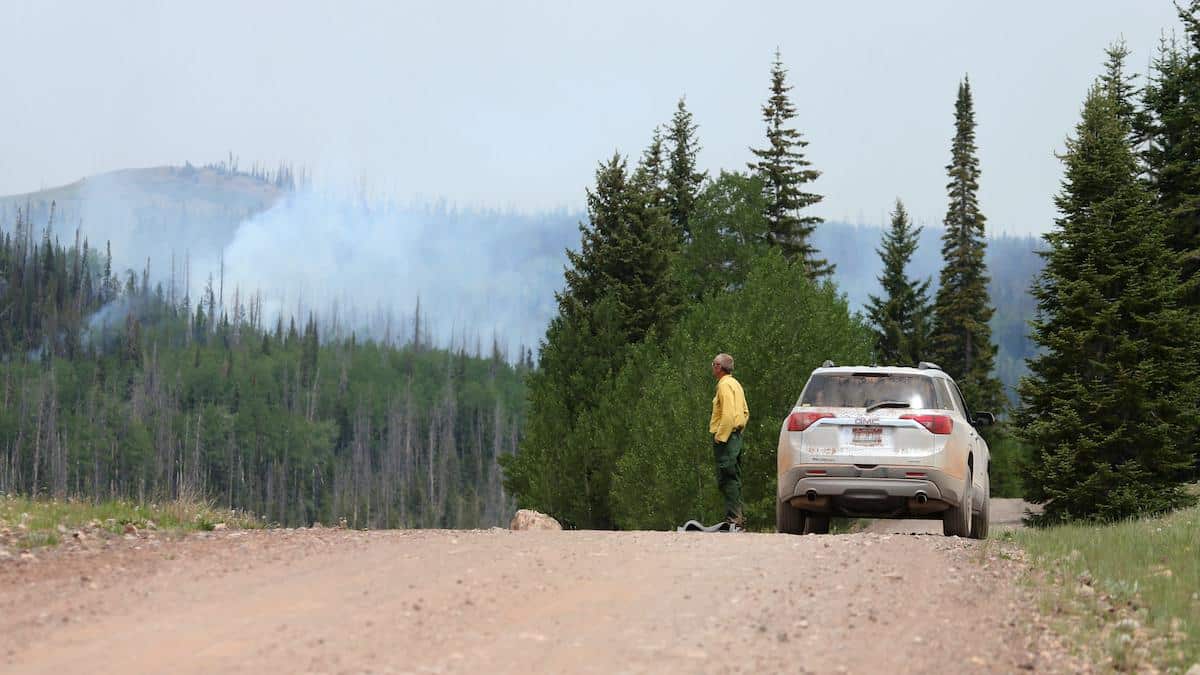

A firefighter stands watch over his crew for flareups as they work a wildfire on June 25, 2017 outside Panguitch, Utah. George Frey / Getty Images
By Alison Gold
Wildfire activity has increasingly threatened life in the western United States over the past several decades. Many of this year’s record-setting wildfires raged over hundreds of thousands of acres. However, one of their most dangerous and understudied effects is too small to perceive with the naked eye: the tiny particles that can be inhaled deeply into the lungs.
New research suggests that by the 2050s, each fire season in the region may cause an additional 155,000 asthma-related emergency room visits and hospitalizations and 0 million more in health care costs compared with today.
The new study predicts that parts of northern Idaho, western Montana, and the coasts of Oregon and Washington may experience the highest rates of increased asthma events. Jennifer Stowell, a postdoctoral associate in climate and health at the Boston University School of Public Health, and her team presented their findings at AGU’s Fall Meeting 2020.
“Scientists think that wildfire smoke is more toxic than just the normal air that we breathe. We’re trying to better characterize that and understand what biological mechanisms might be behind that,” Stowell said. “The closer we can get to modeling these things, the better equipped we will be as far as policy and preparing and planning.”
An Invisible Threat
When a substance burns, particles are released into the air. The size and composition of those particles differ on the basis of what material is being burned. The new research considers fine particulate matter (PM2.5) — particles small enough to be inhaled deeply into the lungs, cause inflammation, and worsen asthma. Some fine particulate matter may even enter the bloodstream.
To conduct the study, Stowell’s team first used novel modeling technologies to project the increase in PM2.5 in wildfire smoke between now and 2050. Using those projections and previously collected data about asthma emergency room visits and hospitalizations on high-smoke days, the researchers then estimated how many more patients are likely to need treatment for asthma by the 2050s. Finally, they calculated the associated health care costs of treating those individuals.
The Problem Grows
The western United States’ arid environment, decades of poor forest management, and global climate change have combined to produce longer, more intense fire seasons in the region, according to Susan Anenberg, an associate professor of global environmental health at George Washington University who was not involved in the new research.
“Smoke exposure is going to increase, and we can anticipate more air pollution–related health outcomes as a result,” Anenberg said.
Some populations may be disproportionately affected by wildfire smoke, including people who work outdoors and those without access to air filtration systems, said Christine Wiedinmyer, an associate director of science at the Cooperative Institute for Research in Environmental Sciences, University of Colorado Boulder, who was not involved in the new research. Wiedinmyer said she expects that more research will emerge on the effects of wildfire smoke on other aspects of human health, like mental health, cardiovascular complications, diabetes, and low birth weight.
Carbon emissions produced today will still linger in the environment and affect the climate decades into the future, Stowell said. Even an immediate drop in carbon emissions will not lead to an immediate decrease in wildfires and pollution. The team hopes its research can help emergency planners and policymakers understand where need will be highest and how to distribute resources.
“We can only expect it to get worse, at least for the next couple of decades, from what it is right now,” Stowell said. “There’s not a whole lot that we can do [to stop that] right now. But we can start planning.”
This story originally appeared in Eos and is republished here as part of Covering Climate Now, a global journalism collaboration strengthening coverage of the climate story.
- Wildfires in Western Canada Created Air Pollution Spikes as Far ...
- Wildfire Smoke Spreads Across Majority of U.S. States - EcoWatch
- How to Protect Your Children From Wildfire Smoke - EcoWatch
- Federal Wildfire Responses Subject to Racism, Economic ...

 233k
233k  41k
41k  Subscribe
Subscribe 